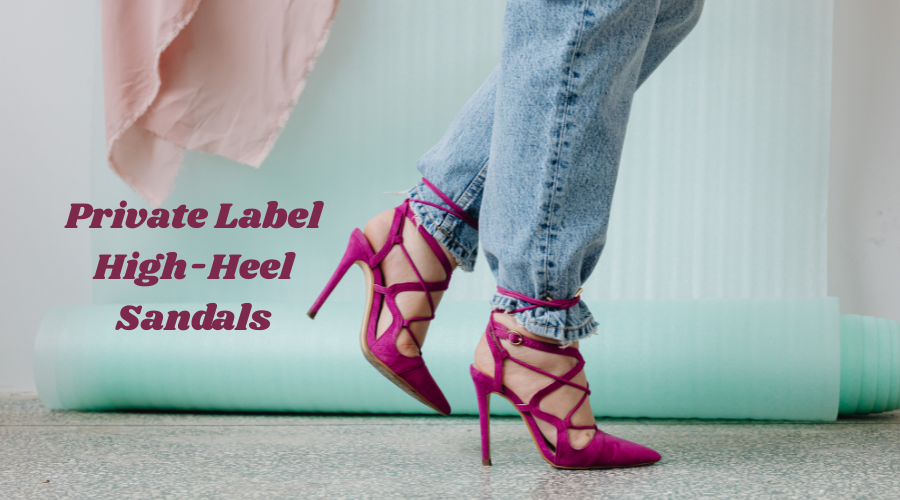How Private Label High-Heel Sandals Can Elevate Your Brand Identity

The existence of private-label products provides companies with unique opportunities to develop specific brands. High-heel sandals are among the most promising lines for private labeling, as they are a popular product with high profit margins.
The concept of privately labeling footwear helps businesses strategically develop products to strengthen brand positioning.
What Private Label Means?
One company produces its products under a different label for another firm, a practice known as private-labeling. The retailer or brand owner controls design specifications, quality standards, and branding variables, whilst the manufacturer is responsible for production.
In high-heel sandals, such a construction will enable fashion retailers, boutiques, and online brands to sell exclusive shoe models without investing in plants or equipment. The brand has complete control over the product's identity and leverages the manufacturer's skills and manufacturing capacity.
Developing Unique Design Identity
High-heeled sandals made under the label allow full design customization based on the brand image.
Style Differentiation
The brands are allowed to tell the heel height, strap, toe shapes, and decorations that fit their signature style. Woven leather straps and natural wood heels could be asked of a bohemian lifestyle brand. An evening-wear luxury brand may label crystal embellishment and a metallic finish.
The design control generates aesthetic consistency between product lines. When sandals are combined in a way similar to other brands, customers perceive the brand identity at first glance.
Exclusive Designs
The contractual arrangement of a privately labeled company is usually characterized by exclusivity, which prohibits dealers of the same design from selling it to competitors. This uniqueness makes it hard for customers to find the same sandals elsewhere, adding value and differentiation to the brands.
There is also limited competition on the same products, which secures profit margins. Clients who are ready to spend on exclusive designs are unable to comparison-shop solely on price.
Quality and Brand Image
The personal touch in specification manufacturing defines the quality standards that position the brand in the market.
Material Selection
Brands qualify the types of leather, hardware, lining material, and sole construction. These options directly affect product durability, comfort, and quality perception.
Premium brands can demand the best quality of grain leather and cushioned footbeds. Cost-effective brands may opt to use artificial materials that nonetheless meet acceptable quality standards. In any case, the quality levels are controlled by the brand rather than accepting whatever generic manufacturers provide.
Construction Standards
The production also has a profound impact on the sandals' performance and durability. Under a private-label relationship, brands may dictate how to build, the sewing pattern, the type of adhesive to use, and the finishing technique.
Poorly built buildings will decrease the turnover and result in bad reviews. Satisfied consumers become repeat buyers and brand champions, enhancing the brand's overall reputation.
Flexibility of Pricing Strategy
Products under private labeling typically have higher margins than those of already known brands.
By doing away with intermediaries and license fees on the brand names, costs are cut. These can be used to improve profit margins or to offer competitive prices without draining margins. Brands can be flexible in strategically positioning products based on market research and business objectives.
The cost of production is also low, allowing promotions from time to time without affecting profitability. Temporary discounts can be cushioned by sales events that attract new customers and by existing margins.
Building Customer Loyalty
Products that are exclusive to a particular brand offer compelling reasons for customers to return.
When customers get high-heeled sandals they adore and cannot find anywhere else, they become loyal to the brand that provides them. This can be applied to the entire brand relationship, not just popular products.
Loyal customers will spend more in the long term and require little marketing to retain and refer others to the brand. These advantages build as brand communities grow through exclusive product offerings.
Storytelling Opportunities
The brands have real stories that can be delivered to customers through products labeled privately.
Design Narratives
Brands can clarify the inspirations behind designs, the choice of materials, and the craftsmanship. These narratives generate feelings instead of actual product meanings. A Mediterranean summer sandal collection embodies lifestyle aspirations, not just footwear.
Open communication about the design process and a commitment to quality reflect brand values. Customers are becoming more authentic and like knowing the idea behind items they buy.
Ethical Manufacturing
Being able to choose manufacturers that follow good practices and sustainable practices builds strong brand associations. Brands could emphasize fair labor practices, environmentally friendly raw materials, or local manufacturing as brand attributes.
Such moral norms resonate with conscious consumers who are willing to pay higher premiums for products that align with their moral principles. The manufacturing conditions can be verified in the course of private-label relationships that cannot be secured through generic wholesale purchasing.
Market Responsiveness
Compared to traditional retail models, the private-label model allows for faster response to market trends.
Trend Adaptation
Brands can adopt trending design elements of their own label when fresh styles become popular. Best trends of high heels are roaming in the fashion industry. Such agility keeps products up to date without waiting for established brands to release equivalent products.
Trends in color, decoration, or silhouette preference could be addressed in later production runs. This is responsiveness, and this keeps the brand new and fashionable.
Incorporation of Customer Feedback
The direct connection to manufacturers helps to design changes based on customer feedback. If there are any comfort issues or requests to select a different color, we can make changes in the next orders for early buyers.
These continuous improvement efforts enable the production of a product that is better aligned with customers' needs. Over time, the brand gains in-depth knowledge of customer needs and develops a competitive positioning strategy.
Promotional Control and Marketing
The market offers exclusive products with distinct marketing opportunities, unlike third-party brands.
Products can be photographed in an environment that builds brand identity. Marketing texts, social media posts, and advertising campaigns are in subtle harmony with visual narratives, with all visuals and models aligned with the brand aesthetic.
New collections have launch events, limited releases, and exclusive previews that generate enthusiasm. The promotional strategies are more effective when applied to promotional label products than to readily available branding.
Conclusion
Private-label high-heel exporter offer many benefits for building a strong brand. Design control is used to guarantee visual uniformity and uniqueness. Quality control defends the brand image. Strategic pricing and growth investment are possible with better margins. Customer loyalty is built around exclusive products that are not available elsewhere.
Featured Articles
Shoe retail today is a tough and competitive market. Customer returns eat up margins. One weak pr...
READ FULLThere are some terms that often cause confusion in people's minds. When it comes to private label...
READ FULLWomen's footwear, like high-heeled sandals, is popular all over the world. They have a specific p...
READ FULL



